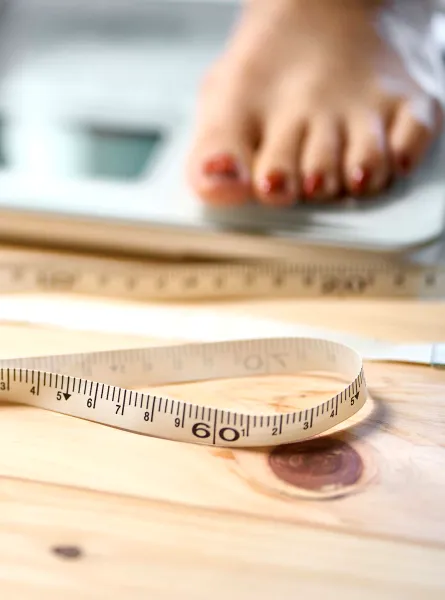
Losing weight or maintaining a healthy weight is a common goal, but it’s important to understand that it doesn’t solely depend on calorie intake or exercise. Several factors influence our weight, including genetics, metabolism, sleep habits, stress, and more. The key lies in adopting sustainable behaviours that support a healthy lifestyle.
The Importance of a Thoughtful and Personalized Approach

Several key elements must be considered for a successful weight management journey. Without them, the risk of failure, relapse, or loss of motivation is much higher:
- Opt for a healthy approach and long-term lifestyle changes.
- Focus on the behaviours to adopt rather than the number on the scale.
- Set realistic, long-term goals and expectations.
- Recognize that some influencing factors are uncontrollable and focus on those that can be modified.
1. Prioritizing Satiety and Fullness

Feeling full is crucial in weight management. When we feel satisfied, we are less tempted to snack between meals or overeat.
1.1 Increase Protein Intake
Proteins help control hunger between meals and maintain muscle mass. It is recommended to consume 1.2 to 1.8 g per kilogram of body weight per day, ensuring it is evenly distributed across meals. However, these needs may vary depending on activity levels, workout intensity, and individual goals such as weight loss or muscle gain.
A registered dietitian can help identify your specific needs and adjust your diet accordingly. Opt for lean protein sources such as white meats, fish, seafood, plant-based proteins, eggs, and low-fat dairy products.
Here are some ideas to incorporate more protein into your meals:
- Breakfast:
- Lower-fat omelette with vegetables and whole-grain toast
- Greek yogurt with fruit and protein-rich granola
- Protein pancakes with fruit and Greek yogurt
- High Protein Apple Overnight Oats
- Meals:
- Marinated chicken with quinoa and roasted vegetables
- Baked salmon with sweet potato and spinach
- Asian-style tofu stir-fry with rice noodles
- Turkey and legume chili with low-fat shredded cheese
- Snacks:
- Cottage cheese mousse with berries and almonds
- Hard-boiled egg with raw veggies and hummus
- Protein berry smoothie
- Homemade protein cookies or bars with oats, nuts, and seeds
1.2 Increase Fibre Intake
Fibre also contributes to satiety by slowing digestion, keeping you fuller for longer, and helping control portions. Here are some simple ways to add more fibre to your diet:
- Increase intake of whole grains such as whole wheat bread, whole wheat pasta, quinoa, millet, bulgur, buckwheat, and barley.
- Fill half your plate with vegetables at meals. For inspiration, check out our article 4 Tips for Adding More Vegetables to Your Plate.
- Eat more fruit throughout the day in breakfasts, snacks, and desserts: smoothies, parfaits, fruit mousse, or fruit salads.
- Add nuts and seeds to snacks and favourite recipes, whether sweet or savoury: salads, stir-fries, noodles, muffins, oatmeal, or cookies.
Incorporate legumes: roasted chickpeas or chickpea curry, beans in soups or chili, lentils in spaghetti sauce or dhal, or even blended into cookies or brownies.
2. Lowering the Energy Density of Your Diet

Energy density refers to the number of calories per portion of food. Energy-dense foods quickly increase calorie intake in small amounts, making it important to limit them.
2.1 Reduce Fat Intake
Fats are the most calorie-dense nutrients. They are found in fried foods, breaded dishes, fatty meats, butter, margarine, oils, sauces, dressings, dairy products, nuts, seeds, and avocados. To support weight management and overall health, moderate fat intake and prioritize healthy fats like unsaturated fats and omega-3s:
- Use small amounts of healthy cooking oils like olive or canola oil.
- Swap some meat portions each week for plant-based proteins like tofu, legumes, or edamame.
- Choose low-fat dairy products such as milk and yogurt with less than 2% fat and cheese with less than 20% fat.
- Make homemade lower-fat dressings and dips by increasing the vinegar ratio or mixing commercial dressings with plain Greek yogurt.
2.2 Reduce Refined Sugar Intake
Refined sugars quickly add calories without providing any essential nutrients. They are found in:
- Sugary drinks (juices, sodas, certain alcoholic beverages).
- Candy and chocolate.
- Processed desserts and pastries (cookies, cakes, ice cream, etc.).
It is recommended to limit intake to less than 50 g per day. Try these strategies:
- Replace pastries with simpler desserts like fruit, unsweetened applesauce, or yogurt.
- Make homemade lower-sugar dessert and snack recipes.
- Choose water as your main beverage, also in the form of herbal teas, infusions, or flavoured water.
Discover more recipes tailored to your needs
To find meal ideas that respect your dietary needs and preferences, visit our recipes section and use the “Weight Loss” filter. You will find tasty and easy-to-prepare dishes!
3. Being Mindful of Eating Behaviours

3.1 Recognizing Hunger and Fullness Signals
Listening to your body and recognizing hunger and fullness cues is crucial for weight management. Eating too quickly can lead to consuming more food than necessary before feeling full.
Tips to improve hunger and fullness awareness:
- Take your time eating—aim for 20 minutes per meal to allow your brain to register fullness signals.
- Don’t eat solely based on the clock—if you’re hungry before mealtime, listen to your body and have a light, nutritious snack.
- Learn to leave food on your plate to avoid eating out of habit or excess. Leftovers can always be saved for later.
- Stay hydrated—drink 2-3L of water daily to avoid mistaking thirst for hunger.
3.2 Managing Emotional Eating
Eating is not only influenced by physical hunger, but also by our emotions. Many of us tend to eat in response to emotions like stress, sadness, boredom, or fatigue. The key is to recognize those moments when the desire to eat is driven by emotion rather than actual hunger.
Here are some tips to better manage eating in relation to emotions:
- Pause before eating: When cravings hit, take a moment to assess whether it’s emotional hunger. Try an alternative like talking to a friend, reading, or engaging in a hobby.
- Identify triggers: Keep a food and emotion journal to recognize patterns and develop healthier responses to emotional situations.
- Practice healthy alternatives: A brisk walk, a few minutes of meditation, or even listening to music can provide immediate relief without compromising your dietary goals.
- Practice mindful eating: Slow down and enjoy each bite without distractions to better perceive fullness cues and prevent automatic eating.
4. Increasing Energy Expenditure Through Physical Activity

It is recommended to get at least 150 minutes of moderate activity per week or 75 minutes of high-intensity activity. You don’t need a gym—small daily actions add up.
Ways to incorporate movement into daily life:
- Take a 15-minute walk during lunch breaks.
- Choose stairs over the elevator.
- Try new activities like yoga or dance to keep exercise enjoyable.
- Stay active naturally by making a list of daily activities that involves movement.
Personalized Support: The Key to Success

Weight management is influenced by many individual factors, including metabolism, eating behaviours, hydration, sleep quality, stress management, and social factors like dining out or alcohol consumption.
Working with a registered dietitian helps tailor strategies to your needs, overcome obstacles, and reinforce discipline. This ensures long-term motivation and effective habits that will benefit you for years to come.
Take control of your well-being today—book a consultation with a registered dietitian for personalized support!





